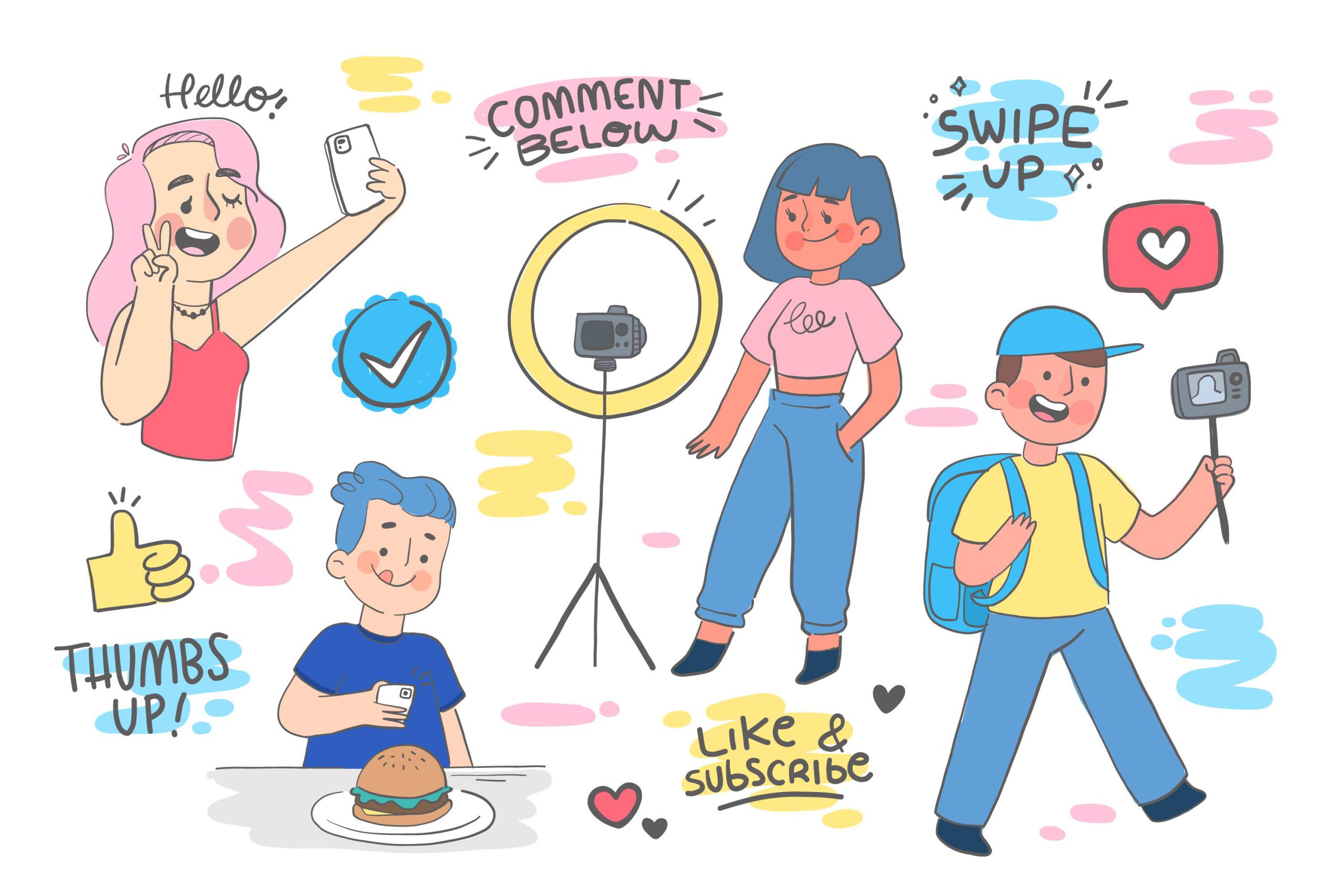
This article, Easetrack, aims to guide marketers, businessmen, and business owners in Thailand to understand the overall landscape of Generation Z in 2024. It explores effective marketing strategies for teenagers, the new generation, and individuals entering the workforce. Given their substantial presence as consumers with considerable purchasing power, the article delves into the question of how to effectively market to Generation Z. Additionally, it includes a case study of a successful marketing campaign that not only captures their hearts but also secures their financial support.
Who is Gen Z? and Why is it important?
The Generation Z group, or Gen Z for short, is a generation born into a world of conveniences and abundant technology. This closely intertwined relationship with technology has significantly influenced their behavior, distinguishing them from older generations. Gen Z encompasses individuals born approximately between 1997 and 2012, making their age range roughly 11 to 26 years. This generation constitutes one-third of the world’s population, representing about 30% of Thailand’s population. Within the Gen Z demographic, there are various age groups that can be further categorized as follows:
-
- Group of teenagers aged 11-18 years
- University age group: 18-22 years old
- First Jobber age group: 22-24 years old
- Working age group: 24 – 26 years old

There are many differences among Gen Z individuals, whether in terms of age or life stage. However, a common trait of Gen Z is that they were born into the age of technology, being intimately familiar with it, almost considering it a natural part of life. Their lives are consistently connected to digital media and the online world. Marketing strategies targeting Gen Z must traverse online channels to effectively engage with this group.
Why focus on Gen Z? This is a question that many may ponder because Gen Z still appears to be predominantly in their teens or in their first jobs, possibly without significant purchasing power yet. However, predictions suggest that by 2024, Gen Z will emerge as the primary driving force in future purchasing trends.
Moreover, amid technological advancements, individuals from other generations are increasingly gravitating towards the online world. It’s plausible that people across different age groups will gradually shift their behaviors and preferences to align with those of Gen Z.
Therefore, marketing to Gen Z in the online realm is akin to hitting two birds with one stone. This approach not only taps into the Gen Z market but also extends its reach to other generations transitioning to online behaviors in a similar manner.
An intriguing aspect of Gen Z is their influence on other generations to purchase imitation products, largely due to their adeptness at providing reviews, narrating stories, and creating compelling content during their teenage years. Their ability to effortlessly initiate trends is why many brands prefer to start their marketing initiatives with Gen Z before targeting other generations.
Moreover, it’s not just their knack for influencing; today’s teenagers also wield considerable purchasing power. According to a report by Vogue, present-day teenagers spend money three times faster than their predecessors, showcasing a purchasing trend that has already surpassed that of Millennials. It comes as no surprise that marketers and brands are eager to make Gen Z their primary customer group.
An important factor contributing to the significant disposable income of today’s teenagers is the plethora of opportunities available to them to earn money, which is far more than what was accessible to teenagers in the past. Some are content creators earning tens or hundreds of thousands per month, while others engage in live streaming or create product review clips with affiliate marketing, making it relatively easy to earn money and share commissions. Contrarily, if we consider how teenagers in the past made money, their options were limited, and the process was not as swift or facile as it is today.

Characteristics of Gen Z people
Gen Z is a new generation of people who were born with technology and are connected to the online world almost as a part of their lives. This makes them have a unique lifestyle, behavior, and outlook on life as follows:
- Live life online. Whether it’s finding information, receiving news, shopping, or conducting various transactions, everything will be online.
- Be open to different ideas and cultures, ready to accept all differences. Value human equality and principles of human rights.
- Value being yourself, and prioritize your own happiness over money and success.
- Do not be attached to any specific brand; always be ready to change and try new things.
If we understand the way Gen Z people think, their behavior and world view, it will help us to build marketing strategies to communicate with this group in a targeted way.

Repeat: if you’re thinking of marketing to Gen Z, don’t assume they’re all the same. Stop using mass marketing that is stereotypical of yesterday and used to work with Gen Y or Gen Z.
Today’s teenagers are entirely different from teenagers of the past.
Today’s Gen Z teenagers are entirely different from Gen Y or Gen X teenagers; they embody great diversity. A common misconception among marketers is assuming that the new generation, like Gen Z, despises brands or advertisements.
In reality, they don’t hate brands or ads. What they dislike are insincere brands—those that engage in deceptive advertising. Upon closer inspection, it’s evident that they appreciate brands that are sincere, straightforward, show respect for Gen Z, and avoid generic advertising. Rather than passing judgment on teenagers, authentic communication and understanding are crucial.
Most importantly, the brands or marketing strategies that Gen Z embraces are those with a clear stance—a genuine expression of their values. Rather than attempting to capture everyone’s hearts (a strategy bound to fail), brands should decisively choose their side and align with those who share similar values. What’s certain is that brands need to adopt a more human approach, and marketing and advertising must demonstrate common sense. Achieving this will undoubtedly foster loyalty from Gen Z.
For brands aiming to capture Gen Z as customers, it’s essential to recognize that today’s teenagers have much higher standards than their predecessors. They demand actions to align with words; simply using an asterisk with a disclaimer like ‘*For advertising purposes only’ won’t suffice. Gen Z is diligent about mining and preserving a brand’s digital footprint. Therefore, careful consideration before speaking or making promises is crucial. If a brand cannot live up to its words, it’s better not to make promises at all.
Young consumers, especially Gen Z, feel that they can directly connect with brands through digital, online, and social media. Brands that persist in one-way communication in their online marketing risk fading away in the coming years. To capture their attention, brands need to act like people and friends. Social media usage by brands should mimic the natural interactions of ordinary individuals.
This includes talking, joking, making mistakes, apologizing, offering advice, teasing, and even annoying at times. Examples of brands excelling in this approach include KFC, Phai Thong, Mae Pranom, etc. Have you observed the branding guidelines on social media? The key point to emphasize is, ‘Don’t do marketing through social media; turn social media into marketing.’

4 Gen Z marketing strategies.
1. Straightforward, not complicated
Gen Z people are easy to market to because they like straightforwardness. Sell, say sell. No need to make complicated detours. Don’t like lying or hiding the truth. How to market to them must therefore be straightforward. Communicate with short, easy-to-understand messages on social media.
2. Sense of social responsibility.
As Gen Z grows up seeing a world without borders, their consumption habits tend to value brands that value society and respect humanity. Which brands take a stand and communicate the value of human equality? gender equality Be aware of environmental problems or creating value for society, it will gain the hearts of Gen Z people.
3. Communicate marketing through influencers
A characteristic of Gen Z people is that they follow various trends in the world of social media every day. Using famous people who are popular online or influencers is another channel to communicate with Gen Z people, but you should choose influencers who have guru knowledge in areas related to our brand. You don’t have to be a famous person with a lot of followers. But we focus on communicating the sincerity of being a real user. This will help communicate and influence Gen Z people better.
4. Focus on communicating your identity.
The behavioral characteristics that value being independent and relying on your own happiness are the foundations of Gen Z people. This behavior makes them choose to consume brands that help build their value. We must market and communicate to this group of people how our brand allows them to have good taste and be themselves. It’s not about telling how great or good our brand is, it’s about making Gen Z people see that it’s the brand itself that makes them great.
Characteristics of Gen Z include behaviors, ways of thinking, and a worldview shaped by their connection to the digital world. Therefore, Gen Z marketing must be specific, focusing on how your brand will integrate into Gen Z’s lives. If your brand or product is clear and shares the same values that Gen Z stands for, it will attract more Gen Z individuals, making it easy to gain customers.
Picture: Freepik
